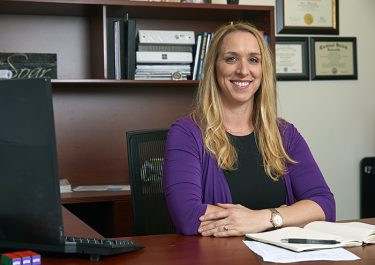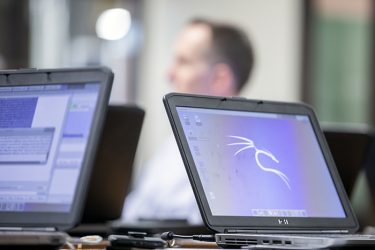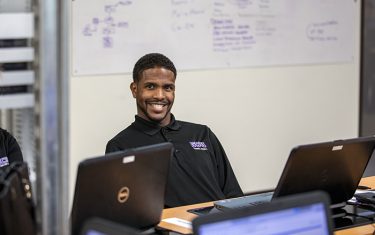
By Lana Sweeten-Shults
GCU News Bureau

Grand Canyon University’s Technology Department recently received a $100,000 GenCyber grant, funded through the National Security Agency in collaboration with the National Science Foundation.
The grant will be used to support a free summer camp on the GCU campus in 2021 designed to help high school educators teach cybersecurity.
This is the first time the Technology Department has received a grant from the National Science Foundation, “which is huge,” said Dr. Heather Monthie, Associate Dean of Technology in the burgeoning College of Science, Engineering and Technology.

The camp, scheduled for June 21-25, 2021, will include hands-on labs, a field trip to learn from cybersecurity engineers and a free raspberry pi computer.
A GCU team not only will teach cybersecurity content to camp participants but will help them develop lesson plans they can use in their classrooms. The camp will be followed by a year of professional development. In those follow-up sessions led by GCU faculty, K12 educators will share the lesson plans and other cybersecurity curriculum they have created with other K12 teachers.
GCU is collaborating with Grand Canyon Education’s K12 Educational Development Department, which will reach out to the K12 teachers in its alliance and help connect them to the GenCyber camp.
"We are excited to get Arizona teachers on board with cybersecurity in collaboration with the GCU Computer Science/Information Technology Department and GCU student outreach efforts," said Corinne Araza, Director of K12 STEM Outreach and Program Development.
Monthie hopes her department can connect with educators from various partner, Title I, rural and tribal schools, particularly those campuses with large minority populations that might not have the same kind of access to technology as other schools.
She added that what's significant about this camp is, “We’re trying to create this community of cybersecurity instructors in Arizona.”

In Arizona alone, more than 12,800 cybersecurity jobs are currently unfilled, according to Cyber Seek’s Cybersecurity Supply/Demand Heat Map. That's a fraction of the more than 504,300 cybersecurity job openings nationally.
By 2021, Cybersecurity Ventures estimates that 3.5 million cybersecurity jobs will be unfilled globally, with as many as 600,000 of those gaps in the workforce here in the United States, say some studies.
That doesn’t bode well for the nation, considering hackers attack every 39 seconds (2,224 times a day, reported the University of Maryland), data breaches exposed 4.1 billion records in the first half of 2019 alone, according to Risk Based Security, and the global average cost of a data breach is $3.92 million as of 2019, as reported by Security Intelligence.

GenCyber started in 2014 with eight prototype camps and has grown to include more than 150 camps around the nation. Its mission is to vastly increase the number of students studying cybersecurity and fill those workforce gaps in the industry.
The GenCyber Grant is not the first significant recognition for GCU's Technology Program, which was acknowledged earlier this year by the NSA and the Department of Homeland Security. They awarded the University's IT-Cybersecurity Bachelor’s Degree Program a National Center of Academic Excellence in Cyber Defense Education designation. Academic institutions only receive the designation after meeting stringent criteria. What it means for the University is that what it offers in cybersecurity education has received a stamp of approval from the NSA and DHS, which opens employment opportunities for the University’s cyber students.
"This grant helps in our efforts to be a leader in building the cybersecurity talent pipeline in Arizona," said Dr. Mark Wooden, Dean of the College of Science, Engineering and Technology. "It strengthens our K12 partnerships and will go a long way in helping us to build a much needed pipeline of traditional cybersecurity undergraduate students."

As an advocate of technology education, Monthie believes it is important to help build the cyber community and strengthen cyber education in schools, and not just at GCU.
“My big thing is just helping the teachers feel confident with this," she said. "They shy away from it because they feel like the kids know more than them, and they don’t. Kids are really good users of technology, but they’re not good yet at thinking outside the box of, what kind of problems can I solve with it?”
She added, “I see that this country is in trouble – we’re in trouble if we’re not creating the next generation of technology professionals.”
The GenCyber grant -- and GCU -- is helping do just that.
GCU senior writer Lana Sweeten-Shults can be reached at 602-639-7901 or at [email protected].
Related content
GCU Today: IT-cyber program gets NSA, DHS stamp of approval



































































